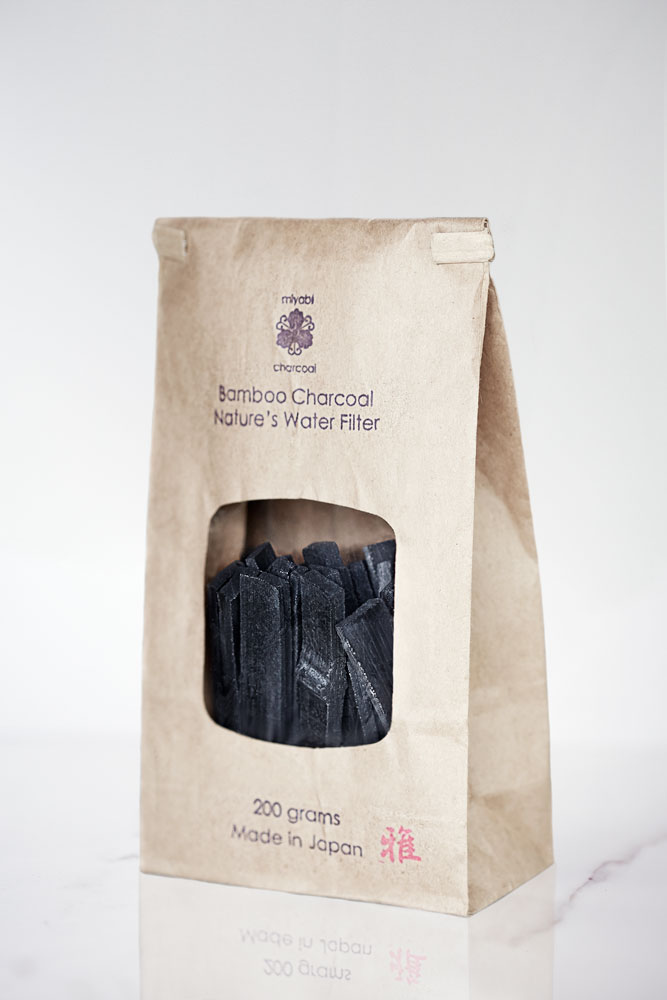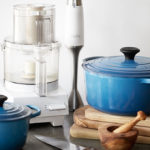
If you take my advice on a single product, let it be Bamboo Charcoal Water Filters
Whether you’re set up with a home water filtration system or not, you should strongly consider adding Miyabi’s Bamboo Charcoal water filters to your water purification tool-kit. Why? Because water is the foundation for life and good health, and with this portable water purification system you will drink more clean water. Simple as that.
After doing my own reconnaissance
I found that beyond the noticeable removal of chemicals like chlorine, using bamboo charcoal water filters has many other benefits. Here are some obvious and not so obvious perks:
- Portable sticks allow you to filter tap or bottled water on the go
- Infuses your water with over 300 types of micro-organic minerals essential to good health; such as, potassium, magnesium and calcium
- Kills bacteria in your water (I have witnessed this first hand, as my stainless steel water bottle no longer gets funky after a few days of continuous use)
- Has an alkalizing effect on the water–improving my acidic tap water significantly as shown in the strip test below
- Emits far infrared rays, which release negative ions that absorb pollutants and improves hydration by breaking down water molecule clusters into smaller, more absorbable organized groups (1)
- Recent studies show that it naturally repels water, while it’s crystalline structure locks in impurities such as oils and other organic pollutants like pesticides, solvents, pharmaceuticals, and industrial chemicals (2, 3, 4, 5)

Tap water to the left and Miyabi Charcoal purified water to the right.
Water purification, as elegant as it is ecological
I discovered Miyabi Charcoal at a Coeur tradeshow in LA. When I asked Ramona Bajema, the primary founder of Miyabi, to give me the scoop on her product I was immediately struck by the authenticity of her conviction.
In brief, she explained that:
- She discovered bamboo charcoal water filters in 2011 while living in Japan and working as a program director for AmeriCares, helping to bring relief to tsunami victims.
- In Japan carbonized bamboo has been used as a method for water filtration for many centuries.
- There have been several studies carried out in Japan which prove the efficacy of this method of water purification.
- That it works like a sponge trapping chlorine and other chemicals in its porous surface, and above all, that the difference is palpable.

It looked too simple to be true
Nevertheless, I was excited to give the charcoal a try. I’d just moved to L.A. and my new faucet wasn’t compatible with any countertop filtration systems. Ramona was right. I could actually taste the difference.
I was surprised at how much better my L.A. tap water tasted
But more than that, I had been noticing that I was having a hard time getting myself to drink enough water at the time–as if I had some kind of resistance to it. After using the Miyabi Charcoal water filters I was suddenly finding that my liter sized bottle was gone half way through the day, rather than still half full at the end of the day. This was especially curious to me and prompted me to do a bunch of my own research.
Thankfully it’s not magical thinking
There’s plenty of science to back up carbonized bamboo’s powerful purification properties. A 2003 Japanese study shows that bamboo charcoal carbonized at high temperatures, such as Miyabi Charcoal, can remove ammonia, lead, mercury, cadmium, copper, chlorine, and chlorides from water. (6) Plenty of other studies on carbonized bamboo have been conducted in the U.S. in a variety of industrial and medical applications further proving the detoxification potential of this incredible natural resource.
As simple to use as it is effective
There are just a couple simple steps to using the water filters:
- Rinse off 3 to 4 pieces of bamboo charcoal (4 pieces of bamboo charcoal per liter)
- Boil the bamboo charcoal for five minutes, then let dry (or simply rinse for speed)
- Add the bamboo charcoal pieces to a pretty glass or stainless steel container of tap water
- Let the bamboo charcoal soak for one to two hours.
- Drink up!
Keep adding tap water to your container for the next 4-6 weeks (or approximately 150 liters of water.) I fill up three liter sized containers every night and keep them going all day, so there’s rarely a time that I’m out of purified water. If you can’t wait an hour, when the water filters are fairly fresh they make a big difference within 20-30 minutes.
It gets even better
Once your bamboo charcoal water filters are exhausted there are multiple different uses for the expired pieces:
- Improve air quality by placing the used charcoal in areas of the house that could use a refresher, i.e.: bedside (for sound sleep), shoe closet, litter box, etc.
- Keep produce fresh longer by placing a few in pieces in each crisper drawer
- Reduce EMF radiation by placing the charcoal around electronics, such as: cell phones, computers, and even seemingly benign devices like bedside alarms
- Make an EMF absorption pad for your laptop (DIY instructions coming soon!)
So now we’ve established that bamboo charcoal is truly awesome, especially in light of water quality issues
But why Miyabi water filters?
For 1) it’s an affordable product, a 6 month supply of water filters is $28 for pitcher style or $35 for skinny bottle style and 2) the company’s environmental mission is something we could all get behind.
A natural evolution
At the time that she discovered bamboo charcoal water filters, Ramona’s family was looking for an affordable and effective solution for purifying their tap water in Ojai. Ramona learned from elders in a rural area of Japan that of the different types of charcoal that takesumi (bamboo charcoal) is the most effective for water purification. After testing it and deciding to stick with this type of charcoal, over time friends in town began to notice how great their water tasted. Soon enough Ramona found herself shipping charcoal to other people in her community.
Bamboo charcoal presented an opportunity to help make clean water accessible to a broader public
This sparked the decision to import the product for the U.S. market. Her second motivation was the prospect of it being an effective solution in reducing the use of plastic bottles and other plastic waste, such as Brita systems. This is why Ramona created the skinny sticks–so that they can fit neatly into any water bottle.
Ramona is committed to finding environmental solutions to help preserve our planet
And she, much like me, believes that consumers are an important part of the equation. As she sees it, bamboo charcoal water filtration is an option for people who care about the environment, and in providing access to this incredible product she is grateful for the opportunity to play a role in the solution.
Naturally, Miyabi Charcoal packaging is made with 100% recycled and recyclable paper, stamped with toxin-free water-based ink.
Buy Miyabi Charcoal Filters
Directly on the Miyabi website, at Plenty on Bell in Los Alamos, CA, at Collective 23 in Hudson, NY and in Ojai, CA, Amara Healing Center of Ojai, Gallery 525, In The Field and Chief’s Peak at the Ojai Rancho Inn.
- Y. J. Ye, Z. F. Zhang (2013), “Research Progress of the Properties and Application of Bamboo Charcoal”, Applied Mechanics and Materials, Vols. 395-396, pp. 646-649.
- Hu C, Zou X, Liu J, Zhang S, Feng Y, Huang X (2014), “A novel application of modified bamboo charcoal to treat oil-containing wastewater and its modified mechanism.” Water Sci Technol. 2014;70(12):1992-7. doi: 10.2166/wst.2014.446.
- Hata M, Amano Y, Thiravetyan P, Machida M (2016), “Preparation of Bamboo Chars and Bamboo Activated Carbons to Remove Color and COD from Ink Wastewater.” Water Environ Res. 2016 Jan;88(1):87-96. doi: 10.2175/106143015X14362865227751.
- Determination of estrogens in environmental water samples with solid-phase extraction packed with bamboo charcoal prior to high-performance liquid chromatography-ultraviolet detection.” Anal. Methods, 2011,3, 2568-2572. doi: 10.1039/C1AY05453H.
- Kawaguchi, E. (Kagoshima-ken. Forest Experiment Station, Kamou (Japan)), Kobayashi, R. (2003), “Characteristics and functions of bamboo charcoal carbonized at different temperature: Effects of carbonizing temperature on reduction of residual chlorine, ammonia, and volatile organic compounds (VOC) .” Bulletin of the Kagoshima Prefectural Forest Experiment Station. ISSN : 0289-6885.






